Redditor Discovers That His Neighbors Called The Police On Him Because He Was Walking His Dog
For years now, there has been a lot of prejudice against certain dog breeds that are considered dangerous, regardless of whether they are doing anything wrong. People have labeled these breeds as dangerous, and some believe they shouldn't even be allowed near other people for various reasons.
None of the safety measures you take are considered when people see you walking around with a dog they perceive as a danger to society. The breeds in question are usually pit bulls and rottweilers, and if you've ever owned one of these breeds, then you know just how judgmental people can be.
This Reddit user felt compelled to share his story after his neighbors complained about her walking her rottweiler around the neighborhood. From the start of the story, you can tell that this is a responsible dog owner, as she shared that the dog was trained as a puppy and that she always puts a muzzle on him during night walks.
OP just wanted a scary-looking dog to keep her safe during her night walks, but the dog was calm and would never bark at anyone or jump around when excited. Nothing ever went wrong, but the neighbors were still scared of the dog, and one day she was approached by a concerned parent who told her that she had to stop walking the dog because the children were afraid.
This might sound like a neighborly request, but it was far from that, as the neighbor proceeded to insult OP and call the police. The police arrived, but of course, there was nothing they could do since OP hadn't done anything illegal.
The dog owner decided to post this story on Reddit because she wasn't sure if she was doing anything wrong. Scroll down to read the entire story and see what other users on Reddit had to say about the situation.
OP deliberately got a dog she knew would keep her safe when going on night walks, but she made sure he wasn't dangerous for everyone.
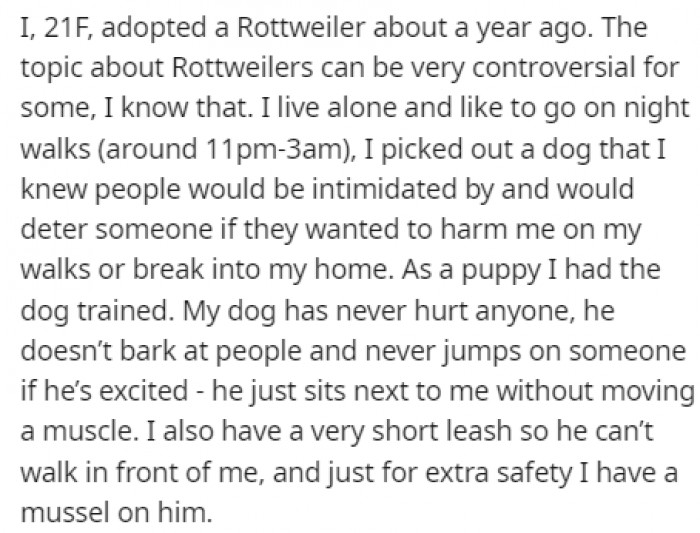
The night walks weren't an issue since no one was outside, but as soon as she took him for a walk during the day, they got a lot of attention.
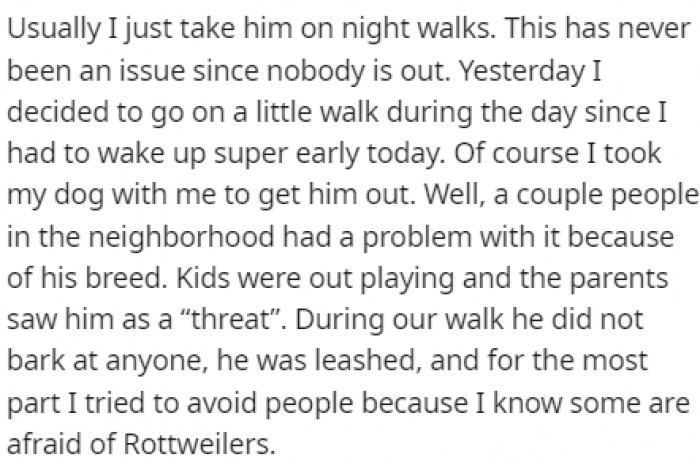
One of the neighbors walked up to OP and decided to call the police on her for some reason...
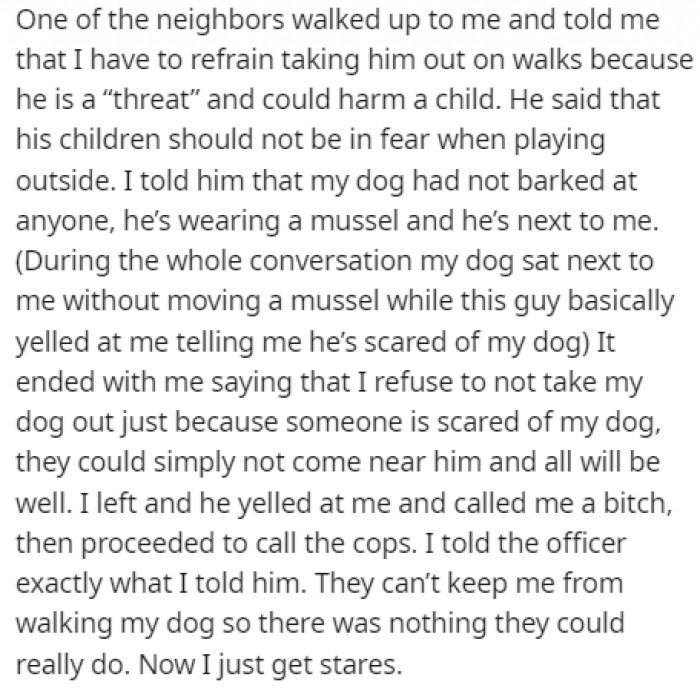
Understanding Neighborhood Dynamics and Bias
Neighborhood dynamics can often influence our perceptions and attitudes towards others, particularly when it comes to pets. Research in social psychology indicates that biases against certain dog breeds can lead to misunderstandings and conflicts within communities. This situation exemplifies how preconceived notions about specific breeds can result in social tensions, highlighting the need for education and awareness. Understanding these biases can help foster a more inclusive and accepting community atmosphere.
The Impact of Breed Bias
Breed bias in dogs often stems from societal stereotypes and misconceptions, leading to negative perceptions of certain breeds. Research in animal behavior suggests that these biases can significantly influence how people react to and interact with dogs, often leading to unwarranted fear or aggression. Understanding the psychology behind these biases is crucial for fostering more positive interactions between dog owners and the public.
Addressing these biases requires education and awareness, as many misconceptions about dog breeds are unfounded.
After receiving some advice, OP decided to walk her dog during the day more than before, and the muzzle is coming off.
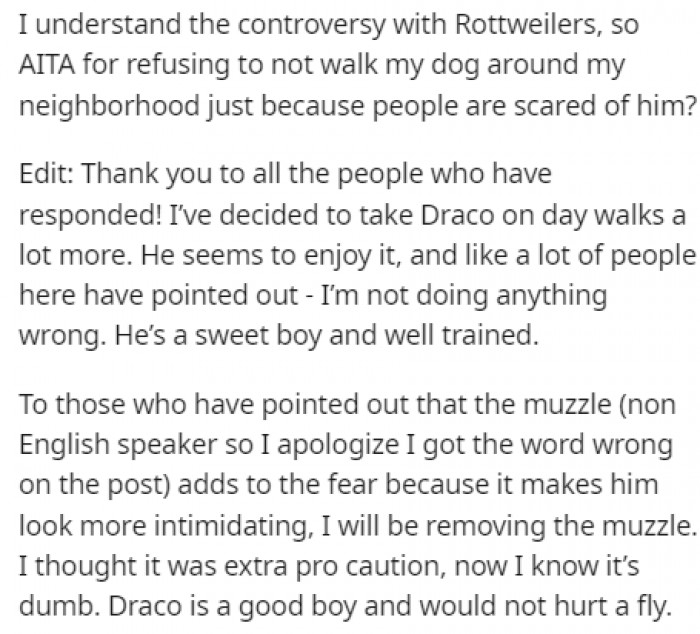
Pit bull owners can relate to this story too.
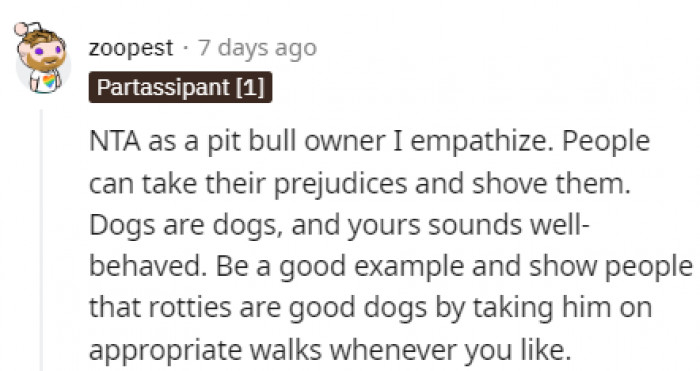
One rotten apple spoils the barrel.
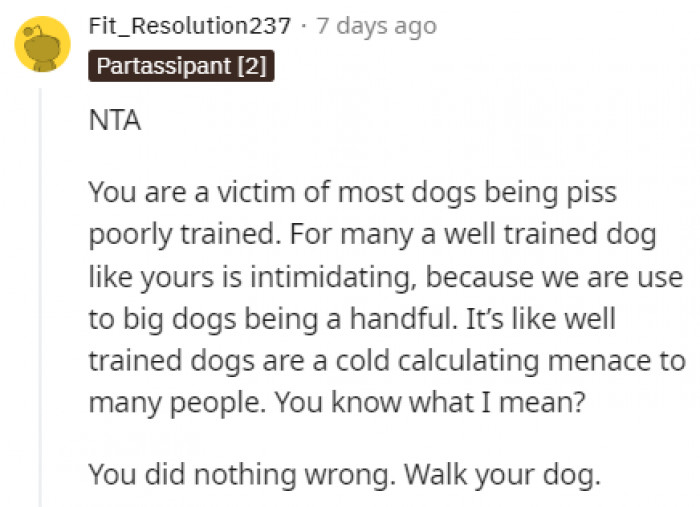
Moreover, the concept of 'social labeling' plays a significant role in how we perceive individuals based on their pets. Studies suggest that people often make assumptions about a dog's owner based on the breed, leading to stereotypes and unjust judgments. This labeling can create division within neighborhoods, as individuals may feel threatened or uncomfortable around certain breeds. Encouraging open dialogue about these biases can help dismantle stereotypes and promote understanding among neighbors.
Moreover, the role of media in shaping perceptions of dog breeds cannot be overlooked. Studies indicate that portrayals of certain breeds in movies and news can reinforce stereotypes and influence public perception. Encouraging responsible media representation can help combat breed bias and promote a more nuanced understanding of dog behavior.
Redditors recommended that OP take the muzzle off the dog since that makes the dog appear scarier.

Makes sense.
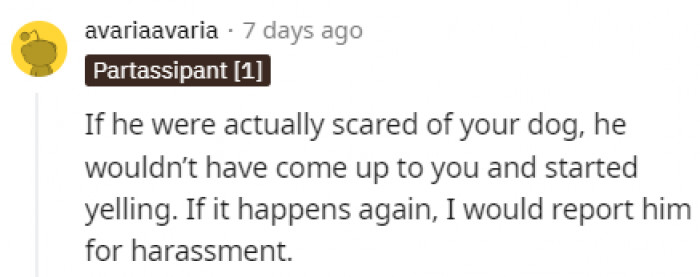
The downside of owning an intimidating dog.
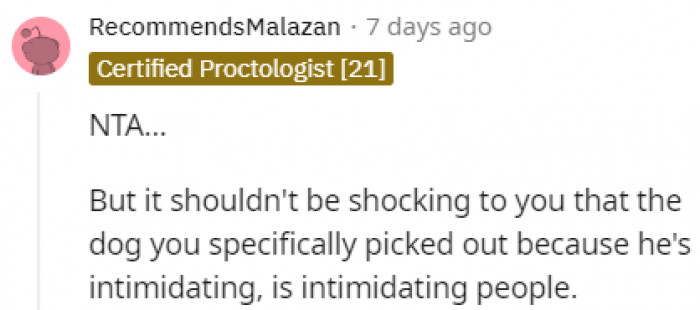
The Importance of Community Education
Education plays a crucial role in addressing biases related to dog breeds. Research indicates that providing information about responsible pet ownership and breed characteristics can help alleviate fears and misconceptions. For instance, community workshops or informational sessions can foster a greater understanding of different breeds and their behaviors. By creating opportunities for education, neighborhoods can promote a culture of acceptance and reduce conflicts related to pets.
Navigating Interpersonal Conflicts
Interpersonal conflicts often arise from misunderstandings and differing perspectives. Research suggests that effective communication is key to resolving conflicts and fostering understanding. In this case, encouraging open dialogue about the neighbor's concerns can help clarify intentions and promote mutual respect.
Promoting empathy and active listening can significantly enhance conflict resolution efforts.
OP really made sure the dog was harmless.
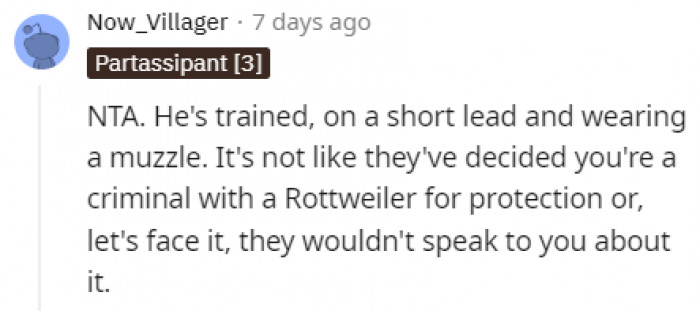
It's a shame that so many owners have to face issues like this just because they own a dog that some people consider dangerous. It's important to ensure your dog is harmless, but no matter what you do, people will judge you, just like in this story.
Additionally, the emotional impact of perceived judgment can lead to defensive reactions. Studies show that individuals often respond defensively when they feel criticized or judged. Recognizing this dynamic can help individuals approach conflicts with a more balanced perspective, reducing the likelihood of escalation.
The Importance of Education
Education plays a crucial role in changing perceptions of dog breeds. Research indicates that providing accurate information about dog behavior and training can significantly reduce fear and misunderstanding. Offering community workshops or information sessions can facilitate a greater understanding of responsible pet ownership and breed characteristics.
Encouraging positive interactions between dog owners and the community can foster a more supportive environment for all.
Moreover, understanding the role of owners in shaping a dog's behavior is essential. Studies show that responsible ownership practices, including socialization and training, significantly influence a dog's temperament and behavior. Encouraging owners to invest time in training can lead to better outcomes for both dogs and their owners.
Building Community Support
Building community support around dog ownership is vital for fostering positive relationships between dog owners and the public. Research suggests that communities that prioritize responsible pet ownership and education tend to have fewer conflicts. Establishing dog-friendly spaces and events can promote understanding and reduce fear.
Encouraging dog owners to engage with the community can enhance social connections and reduce stigma.
Lastly, fostering a culture of compassion towards pets can lead to greater empathy and understanding. Research indicates that communities that prioritize animal welfare and responsible ownership tend to have more positive interactions between people and pets. Encouraging discussions about responsible pet ownership can help build a more supportive community atmosphere.
Psychological Analysis
This situation emphasizes the complexities of interpersonal conflicts related to pet ownership. By fostering empathy and education, we can navigate these challenges more effectively and promote understanding within communities.
Analysis generated by AI
Analysis & Alternative Approaches
In conclusion, addressing breed bias and fostering positive interactions between dog owners and the community requires education and empathy. By promoting understanding and responsible ownership practices, we can create a more supportive environment for dogs and their owners.
Encouraging open dialogue about concerns can enhance community relations and reduce fear, ultimately leading to more harmonious interactions.
Additionally, building positive relationships among neighbors can help combat bias and promote inclusivity. Studies show that social interactions can reduce prejudice and foster a sense of community. Engaging in neighborhood activities, such as pet-friendly events or community clean-ups, can provide opportunities for residents to connect and build relationships. These interactions can help break down barriers and create a more harmonious living environment.
Coping with Conflict in Neighborhoods
When conflicts arise in neighborhoods, effective communication is essential for resolution. Research indicates that active listening and empathy can help individuals navigate disagreements and find common ground. In this case, engaging in respectful discussions with neighbors about concerns related to dog behavior can help address fears and promote understanding. Encouraging open communication can create a more supportive neighborhood dynamic.
Moreover, the emotional responses to conflicts can be profound. Individuals may experience anxiety or frustration when faced with negative perceptions from neighbors. Studies show that these emotions can lead to social withdrawal or avoidance behaviors, further complicating relationships. Understanding the psychological impact of social judgment can help individuals develop resilience and coping strategies in the face of conflict.
The Role of Community Support
Community support is vital for navigating conflicts related to pets and promoting a sense of belonging. Research indicates that individuals with strong social networks are better equipped to handle social tensions and biases. For instance, forming pet owner groups or community associations can provide a platform for individuals to share experiences and support one another. By fostering these networks, neighborhoods can create a more inclusive environment where all residents feel valued.
Additionally, recognizing the positive aspects of pet ownership can help alleviate fears and promote acceptance. Understanding that pets can enhance well-being and provide companionship can shift the focus from fear to support. Research indicates that shared affection for animals can strengthen community bonds and promote social cohesion. Encouraging neighbors to engage with each other's pets can foster a more inclusive atmosphere and reduce tensions.
Creating a Culture of Acceptance
Ultimately, creating a culture of acceptance within neighborhoods can mitigate biases related to pets. Research emphasizes the importance of fostering an inclusive environment where individuals feel free to express their concerns and share their experiences. Implementing community initiatives that promote understanding and acceptance can lead to stronger relationships among residents. By prioritizing inclusivity, neighborhoods can cultivate healthier dynamics and reduce conflicts.
Analysis & Alternative Approaches
In conclusion, navigating neighborhood dynamics related to pets can be challenging, particularly when biases and misunderstandings arise. Research supports the idea that education, communication, and community support are vital for fostering inclusivity and reducing tensions. By creating an accepting environment, neighborhoods can enhance the well-being of all residents.



